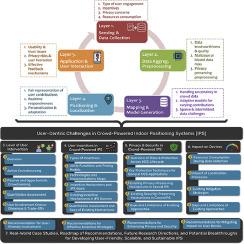面向可扩展的室内定位系统(IPS):以用户为中心的挑战、方法和对用户友好的群体驱动框架的建议
IF 15.5
1区 计算机科学
Q1 COMPUTER SCIENCE, ARTIFICIAL INTELLIGENCE
引用次数: 0
摘要
人群驱动的室内定位系统(IPS)为传统的基于现场调查的方法提供了一种经济高效且可扩展的替代方案,用于生成无处不在的测量驱动的IPS的离线先决条件。然而,这种范例的广泛采用取决于解决以用户为中心的关键挑战,这些挑战跨越了众动力架构的所有层。本调查对这些挑战进行了系统的调查,包括用户参与方案、激励机制、隐私和安全威胁,以及数据收集和本地化对用户设备的影响。据我们所知,这是第一次深入探讨这些问题及其对数据质量、可靠性和可伸缩性的影响,并特别强调用户友好性。它将这些挑战映射到群体驱动IPS的架构层中,回顾之前的研究,分析用户的角色,并在主动、机会主义和被动参与方案中分配任务,强调这些任务的目标以及与每个方案相关的权衡。其次,它区分了群体驱动IPS与其他领域的激励机制,强调了内在和外在动机如何与IPS特定目标保持一致。然后,它调查了当前激励机制中使用的数学模型,以及它们的目标和局限性。随后,回顾了隐私和安全风险,现有文献中提出的保存技术,以及它们的不足。此外,调查还讨论了数据收集和本地化对用户设备的不利影响,确定了潜在的用户负担和相关的缓解战略。最后,它概述了开发用户友好、可持续和可扩展IPS的建议路线图。本文章由计算机程序翻译,如有差异,请以英文原文为准。

Towards scalable indoor positioning systems (IPS): User-centric challenges, methods, and recommendations for user-friendly crowd-powered framework
Crowd-powered Indoor Positioning Systems (IPS) offer a cost-efficient and scalable alternative to traditional site-survey-based methods for generating the offline prerequisites of ubiquitous, measurement-driven IPS. However, the widespread adoption of such paradigms depends on resolving critical user-centric challenges that span all layers of the crowd-powered architecture. This survey provides a systematic investigation of these challenges, including user participation schemes, incentive mechanisms, privacy and security threats, and the impact of data collection and localization on user devices. To the best of our knowledge, this is the first in-depth review that examines these issues and their implications for data quality, reliability, and scalability, with a specific emphasis on user-friendliness. It maps these challenges across the architectural layers of crowd-powered IPS, reviews prior studies to analyze the user’s role and assigned tasks in active, opportunistic, and passive participation schemes, emphasizing the objectives of these tasks and the trade-offs associated with each scheme. Next, it distinguishes incentive mechanisms in crowd-powered IPS from those in other domains, highlighting how intrinsic and extrinsic motivations can be aligned with IPS-specific objectives. It then surveys the mathematical models employed in current incentive mechanisms, along with their goals and limitations. Subsequently, it reviews the privacy and security risks, the preservation techniques proposed in existing literature, and their shortcomings. In addition, the survey discusses the adverse impacts of data collection and localization on user devices, identifying potential user burdens and associated mitigation strategies. Finally, it outlines a roadmap of recommendations for developing user-friendly, sustainable, and scalable IPS.
求助全文
通过发布文献求助,成功后即可免费获取论文全文。
去求助
来源期刊

Information Fusion
工程技术-计算机:理论方法
CiteScore
33.20
自引率
4.30%
发文量
161
审稿时长
7.9 months
期刊介绍:
Information Fusion serves as a central platform for showcasing advancements in multi-sensor, multi-source, multi-process information fusion, fostering collaboration among diverse disciplines driving its progress. It is the leading outlet for sharing research and development in this field, focusing on architectures, algorithms, and applications. Papers dealing with fundamental theoretical analyses as well as those demonstrating their application to real-world problems will be welcome.
 求助内容:
求助内容: 应助结果提醒方式:
应助结果提醒方式:


